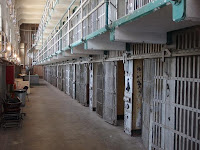 |
| [prison block*] |
One outstanding aspect of English is the incredible number of words for
almost any concept. It is a bit of a mixed blessing as, on the one hand, it
allows for great precision both in terms of meaning and register but, on the
other hand, can create a major challenge
for non-natives as they find the distinctions between the words difficult if
not impossible to ascertain and remember. In previous posts, I have discussed
synonyms for walking and eating. In this post, I will review a more punishing
matters, specifically jail. The plethora of words differ in terms of origin,
use and register and don’t necessary imply identical institutions.
For a short stay, prisoners are sent to a jail or a gaol as it used to spelled in the UK. Appropriately, the word derives from a Latin word for cage, which the Normans brought to England. A more modern of version of this short-stay lodging is a detention center, which I suppose sounds more politically correct although the British used the term to describe the camps where they placed Jews that tried and failed to reach Palestine before the establishment of the state of Israel. The location of a stay of a few hours, as in dealing with drunks, is a lock-up cell. A 20th century American slang term is the can, as in “if you don’t stop doing that, you will be thrown in the can. “ Another slang term is the clink, referencing the sound of the jail doors closing.
 |
| [Alcatraz prison] |
For lengthier stays, prison is the place criminals call home. Once again, old French, in this case prisoun, meaning captivity, is the source. Based on a peculiar if not evil principle, the Americans began building penitentiaries in the 1830’s, which involved placing prisoners in solitary confinement and having them ponder their sins without distraction so that they can make penitence. Alas, the far more common result was insanity but it took a while before the powers-that-be understood that. Criminals shortened the name to pen as in being “sent to the pen”. Similarly misguided, the justice system sent criminal juveniles to reformatories, supposedly to educate them and turn them into model citizens. The idea is promising but even now there are a few issues with the application. In terms of slang, countless words exist but an older term up the river refers to Sing Sing, a rather harsh prison in New York, while 'the rock" was Alcatraz. As compared to jails, potential and actual residents sometimes refer to prison as the slammer probably to do the oud noise created by its heavy doors closing.
One European method of dealing with crime, small and great alike, was to send them away to penal colonies far away. France’s Guyana and England’s Australia and New Zealand are two infamous examples of sweeping the problem across the sea. The Russians have so much land that they can send their prisoners, criminal and political, to Siberia, in modern terms to the Gulag, “to count trees” as the Russian expression goes. As Hannah Arendt might say, the Europeans did not intend to kill their prisoners but were not overly concerned about their health. For that matter, the Chinese have further developed the Nazi labor camps, locally known as reeducation camps, adding political and religious pressure to the experience. What you don’t see does not bother you?
As a last note, the military has its own special inns. Dating from a
time when forts were built out of wood, a stockade is the place of
resident of disobedient soldiers with another option being the brig, which derives from the
French word brigadin, a small fighting ship used by pirates and raiders.
In any case, the rooms tend to be a bit small. Countries intern prisoners from
other countries in prisoner-of-war (POW) camps while residents that are
suspicious because of their country of origin are placed in internment camps
as the Americans did to Japanese-Americans during World War II. As they say in
Hebrew, better that you don’t know (about it) or maybe not.
I hope that your understanding of these terms remains in theory only and
that the only use of them is for understanding text, notwithstanding the song
by Elvis Presley Still, on a linguistic level, the sheer variety and
specificity of English words regarding being locked up says somethings about
the linguistic history of English and social history of English-speaking
countries.
* Use picture captions as they help the blind fully access the Internet.
Pictures via Pixabay















